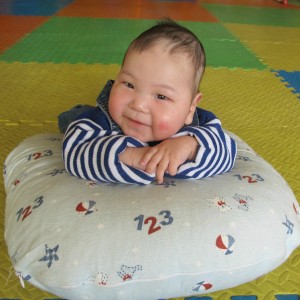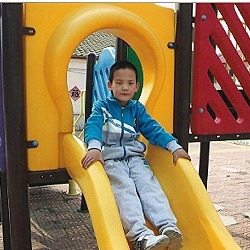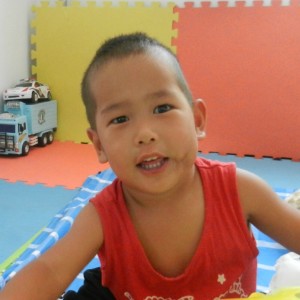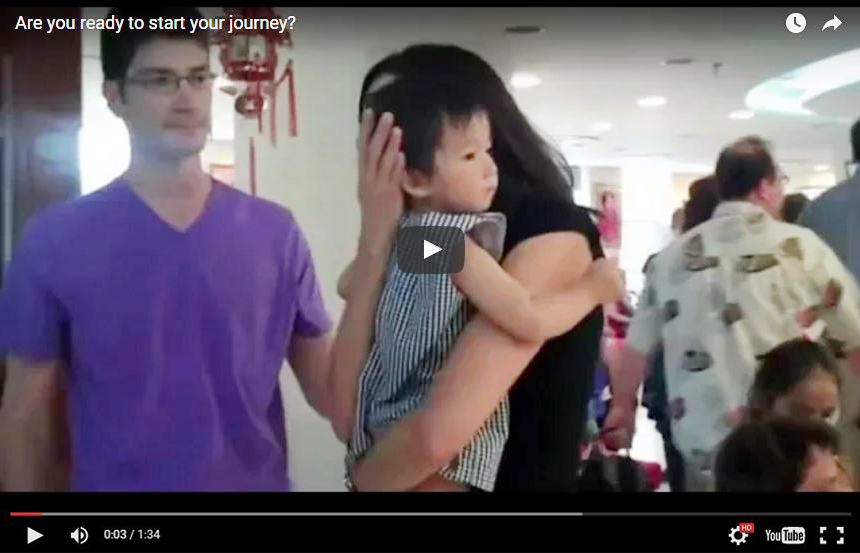New Kids on the Block
 Hi there! My name is Calvin and I am 1 years old! My doctor’s tell me I have PKU and eczema but I don’t let these things stop me from smiling! My caretakers say that I am very ticklish and am always laughing out loud when people tease me! I always have a ready smile and am very fond of playing games. I am adjusting well to my special diet for my PKU and my caretakers have high hopes for me. This isn’t all the information about me so please contact my friends at Great Wall if you want to review my file!
Hi there! My name is Calvin and I am 1 years old! My doctor’s tell me I have PKU and eczema but I don’t let these things stop me from smiling! My caretakers say that I am very ticklish and am always laughing out loud when people tease me! I always have a ready smile and am very fond of playing games. I am adjusting well to my special diet for my PKU and my caretakers have high hopes for me. This isn’t all the information about me so please contact my friends at Great Wall if you want to review my file!
 Hi! My name is Simon and I am 6 years old. I was born with anal atresia but some nice doctor’s performed surgery and I recovered very well from it. I have a regular diet and a great appetite. I love listening to music and playing with toys just like any other kiddo! My caretakers say I seldom cry and that I am fairly introverted. This isn’t all the information about me so contact my friends at Great Wall if you want to review my file!
Hi! My name is Simon and I am 6 years old. I was born with anal atresia but some nice doctor’s performed surgery and I recovered very well from it. I have a regular diet and a great appetite. I love listening to music and playing with toys just like any other kiddo! My caretakers say I seldom cry and that I am fairly introverted. This isn’t all the information about me so contact my friends at Great Wall if you want to review my file!
 Hello! My name is Landon and I am 8 years old. My doctors tell me I have Hepatitis B but I don’t let this stop me from being a happy kiddo! I live with a foster family and am doing extremely well. I often help with chores and I am described as being very obedient. I am cognitively on target and I have great self-care ability! I love playing ball with my friends and I get along very well with other kiddos. This isn’t all the information about me so contact Great Wall if you are interested in reviewing my file!
Hello! My name is Landon and I am 8 years old. My doctors tell me I have Hepatitis B but I don’t let this stop me from being a happy kiddo! I live with a foster family and am doing extremely well. I often help with chores and I am described as being very obedient. I am cognitively on target and I have great self-care ability! I love playing ball with my friends and I get along very well with other kiddos. This isn’t all the information about me so contact Great Wall if you are interested in reviewing my file!
 Hello! My name is Ben and I am 3 years old. I was born with anal atresia but some nice doctors performed surgery when I was younger and I recovered very well from it! I also have CHD and a facial hemangioma but I don’t let these things get me down! I am developmentally on target and am described as being a shy li ttle guy! I love listening to music and playing with other kiddos. My file is slightly outdated so my friends at Great Wall are working hard to learn more about me. If you think you could be my forever family, contact Great Wall to review my file!
Hello! My name is Ben and I am 3 years old. I was born with anal atresia but some nice doctors performed surgery when I was younger and I recovered very well from it! I also have CHD and a facial hemangioma but I don’t let these things get me down! I am developmentally on target and am described as being a shy li ttle guy! I love listening to music and playing with other kiddos. My file is slightly outdated so my friends at Great Wall are working hard to learn more about me. If you think you could be my forever family, contact Great Wall to review my file!
Read More
3 Things Your Social Worker Wants You to Know…
In the world of adoption, social workers can be your rock in a sea of uncertainty. What paperwork still needs to be done? How should I prepare to bring my child home? What about my home study? They’re there to counsel you through the hard times, and celebrate the milestones. They’ve seen it all and accumulated a wealth of knowledge along the way, so I decided to ask one of our social workers for a few words of advice. These are her three pointers for families that are looking to get started with the adoption process.
1. You are traveling to a FOREIGN country – a country which does not share the same customs, mannerisms, or values that you have. Please be respectful to these people. Please do NOT go with a “serve me” attitude. Regardless of the time, effort, and finances involved in this wonderful quest to become a family – we should remember that it is ultimately the foreign country’s decision on the willingness to allow us to adopt. If families could remember the goal: to bring a child home to his or her forever family, that would be wonderful.
 2. Please understand that God did not create us to have crystal balls. Therefore, it is difficult for us to predict: the time frame it will take for you to complete your adoption, the exact health of your child, the unforeseen hurdles that accompany an adoption and the process. Sometimes, biological children come early or late, with or without deformities, etc…. Just like a pregnancy, adoption is a step of faith. I encourage families to educate themselves as best they can, but in the end, the decision does come down to a step of faith. I told this story to a fishing captain one day:
2. Please understand that God did not create us to have crystal balls. Therefore, it is difficult for us to predict: the time frame it will take for you to complete your adoption, the exact health of your child, the unforeseen hurdles that accompany an adoption and the process. Sometimes, biological children come early or late, with or without deformities, etc…. Just like a pregnancy, adoption is a step of faith. I encourage families to educate themselves as best they can, but in the end, the decision does come down to a step of faith. I told this story to a fishing captain one day:
We sat at a dinner table, discussing the adoption process. He was very apprehensive, asking me for a guarantee that “it will happen” or he wanted his money back, even for services that had been performed for him to get to the waiting stage. I told him I could not guarantee it. I explained the risks that accompany an adoption from a foreign country, stating they hold all the power and can ultimately do what they want, even though the process had a stable history. He was frustrated and could not grasp what I was trying to tell him. I decided that the best way to help him understand was to relate it to something he understood very well: chartering a boat of fishermen. I asked him what his goal was for the men he took out on his fishing expedition. He said, “To have fun but to catch fish.” I asked him what he did if they spent the entire day out on the boat and not one fish was caught. I asked if he gave them a full refund. He finally understood but said that most times, when he took a group out, some fish were caught but that there were no guarantees.
3. I wish families did more pre-planning. Internet research is great but calling specialists and having a plan in action, should the need arise – that is best. Going into something with “eyes wide open” will enable parents to be the best parents they can be. It reduces the panic and stress that will set in and take its toll when no preparation is in place. I remember when my dad had a massive heart attack and was in the hospital for three weeks. He pulled through and, several weeks after, sat us all down for a discussion. He handed us a piece of paper that had every account and policy he owned, where everything was, and the procedure for handling things if and when the time came. He said all he could think about when he was in the hospital was, “What if I don’t make it and my family has no idea where everything is and what to do?” Realistic preparation is best.

